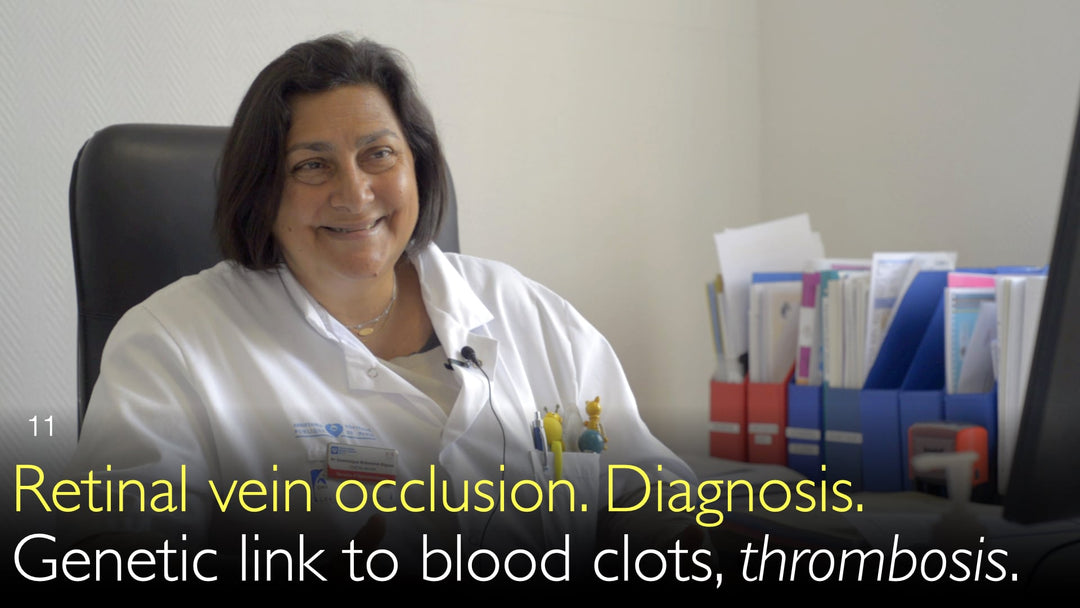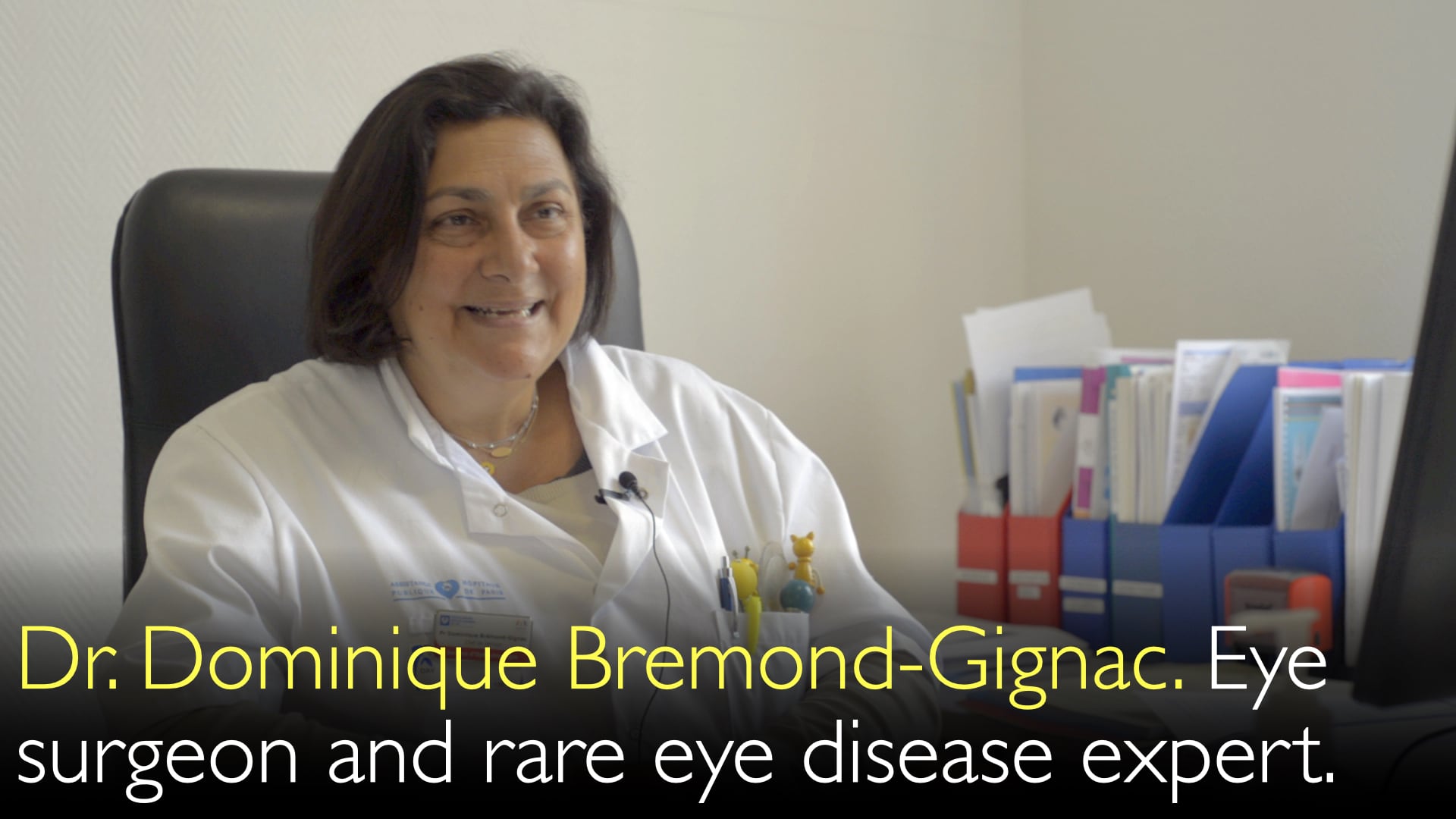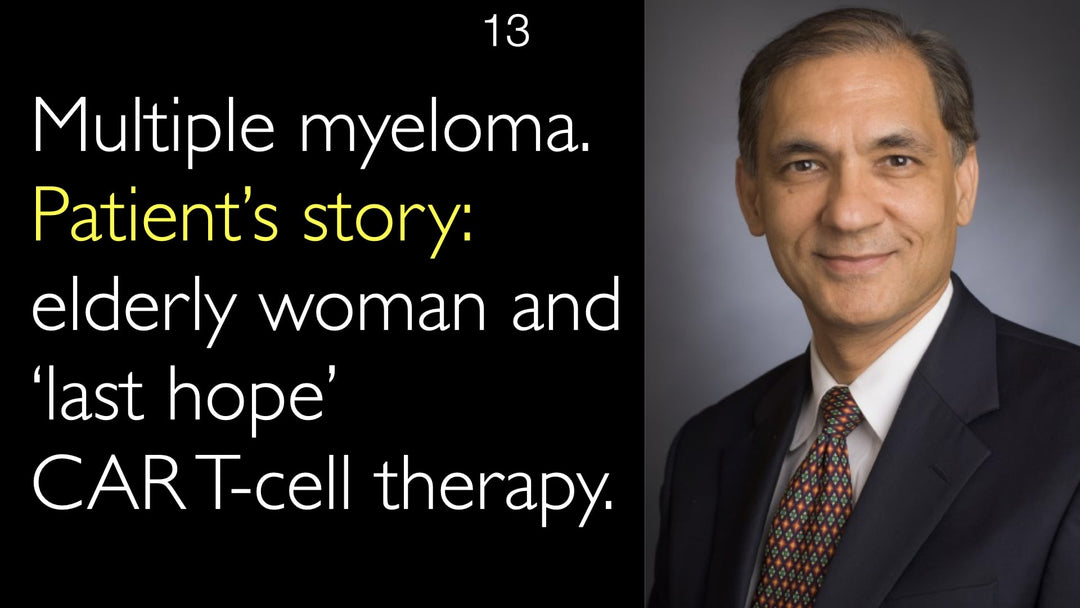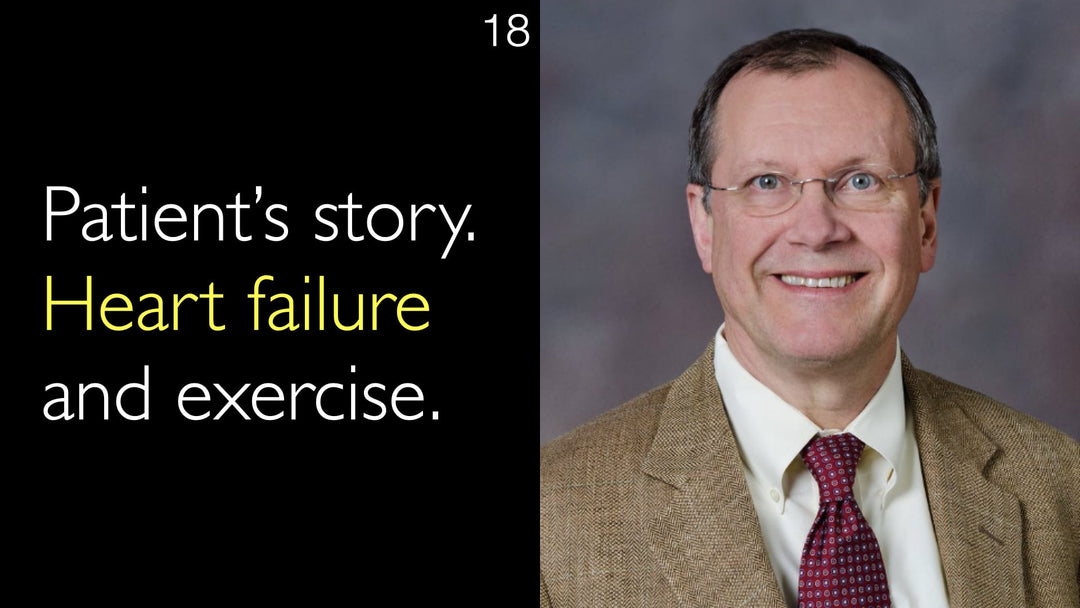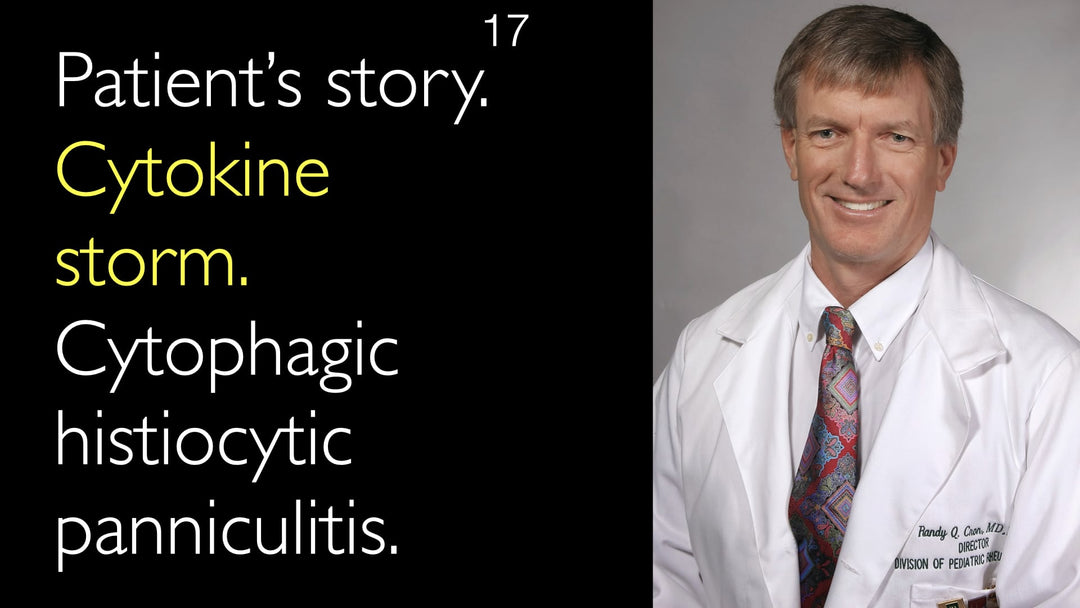Leading expert in pediatric ophthalmology, Dr. Dominique Bremond-Gignac, MD, explains how retinal vein occlusion in children is a rare but serious condition often linked to underlying genetic thrombophilia variants, requiring a comprehensive diagnostic workup and long-term treatment with low-dose aspirin to prevent dangerous systemic blood clots.
Retinal Vein Occlusion in Children: Diagnosis, Genetic Causes, and Treatment
Jump To Section
- What is Retinal Vein Occlusion?
- Extreme Rarity in the Pediatric Population
- Diagnostic Challenges and the Importance of a Full Workup
- The Genetic Link: Thrombophilia Variants
- Systemic Implications Beyond the Eye
- Treatment with Low-Dose Aspirin
- Importance of Family Screening
- Full Transcript
What is Retinal Vein Occlusion?
Retinal vein occlusion is an eye condition where a blood clot blocks one of the veins that drains blood out of the retina. This blockage leads to disc edema (swelling of the optic nerve head) and retinal hemorrhages (bleeding), which can cause sudden vision loss. While more common in older adults, its occurrence in children is exceptionally rare and often signals an underlying systemic health issue.
Extreme Rarity in the Pediatric Population
As Dr. Dominique Bremond-Gignac, MD, emphasizes, retinal vein occlusion in children is a "very, very rare disease." The diagnosis is so unusual that when a pediatric case is identified, it prompts an immediate and extensive search for a root cause. Dr. Bremond-Gignac's decade-long research, connecting with colleagues across Europe through the ERN-EYE network (European Reference Network for rare eye diseases), initially yielded very few cases, highlighting the condition's scarcity.
Diagnostic Challenges and the Importance of a Full Workup
Diagnosing pediatric retinal vein occlusion requires a high index of suspicion because its presentation can mimic other conditions. A comprehensive diagnostic checkup is essential. This involves a detailed examination of the ocular fundus and a full systemic workup to rule out other associated pathologies, such as leukemia. The goal is to move beyond the ocular symptom to identify the hidden systemic problem causing the blood clot.
Dr. Anton Titov, MD, the interviewer, notes that this process reveals there is often "a diagnosis behind the diagnosis," a systemic problem that can manifest in other, more dangerous ways.
The Genetic Link: Thrombophilia Variants
A critical discovery from this research is the strong association between pediatric retinal vein occlusion and genetic thrombophilia. Thrombophilia is a condition that increases the blood's tendency to form clots. Dr. Bremond-Gignac's work identified that multiple children with retinal vein occlusion had not just one, but two specific thrombophilia variants.
This genetic link explains the problem with blood fluidity that leads to the formation of a clot in the delicate retinal vein. Identifying these variants is a crucial step, as it directly informs long-term treatment and management strategies to prevent future clotting events.
Systemic Implications Beyond the Eye
The presence of thrombophilia variants means the risk of blood clots is not confined to the eye. As Dr. Anton Titov, MD, discusses, these genetic factors can lead to life-threatening conditions. Blood clots can develop in the lower extremities (deep vein thrombosis) and can travel to the lungs, causing a pulmonary embolism, which carries a high mortality rate.
Dr. Bremond-Gignac provides a powerful example from her research: the father of one young patient, who carried the same thrombophilia variant, had no eye problems but had a history of phlebitis (vein inflammation often related to clots). This illustrates how the same genetic mutation can cause different thrombotic events in different family members.
Treatment with Low-Dose Aspirin
Once a diagnosis of thrombophilia-linked retinal vein occlusion is confirmed, treatment can begin. Dr. Dominique Bremond-Gignac, MD, and her colleagues placed all the identified pediatric patients on a regimen of low-dose aspirin. Aspirin works as an antiplatelet agent, helping to maintain blood fluidity and prevent the formation of new clots.
This long-term prophylactic treatment is a key strategy in managing the systemic risk posed by the genetic thrombophilia variants, protecting the patient from future thrombotic events in the eye and elsewhere in the body.
Importance of Family Screening
Because the causative thrombophilia variants are genetic, a diagnosis in a child has significant implications for their entire family. Identifying the mutation allows for targeted screening of parents, siblings, and other relatives. As the case of the father with phlebitis shows, other family members may be affected by the same genetic predisposition but present with completely different symptoms.
Proactive family screening and genetic counseling can lead to early diagnosis and preventive treatment for relatives, potentially averting serious complications like pulmonary embolism. The work of Dr. Bremond-Gignac, MD, underscores that treating the patient means caring for the whole family.
Full Transcript
Dr. Anton Titov, MD: What is retinal vein occlusion in children? And how often does retinal vein occlusion in children happen? What are treatment options for retinal vein occlusion?
Dr. Dominique Bremond-Gignac, MD: Retinal vein occlusion in children is a very, very rare disease. I have a story that could be useful to understand how, in 10 years, we arrived at a correct diagnosis of retinal vein occlusion.
The first time I saw a six-year-old boy with a very special eye fundus, it was so similar to retinal vein occlusion in adults. I said, "Okay, it's a retinal vein occlusion." They said, "That's a very unusual situation. Are you sure? It's probably something else." I said, "No, really, it seems to be retinal vein occlusion because there is disc edema and there is retinal hemorrhage." It was unilateral.
We did a complete diagnostic checkup and had many possibilities for diagnosis. We found that there were variants of thrombophilia. They said, "Well, that's quite frequent." But there were two variants of thrombophilia. I said, "Okay, but this is only one case. You're a researcher, but you can't say with one case that thrombophilia is the cause."
For sure, retinal vein occlusion is such an unusual pathology. It could be more frequently caused by generally associated pathologies, like leukemia or all the systemic problems. But when there is a healthy child, you say, "Okay, we must investigate more." When you see thrombophilia variants, you say, "There is a problem with the fluidity of the blood." So you have treatment because you can use low-dose aspirin.
I had in my department a very nice pharmacy student. I said, "Well, you have nystagmus in one eye. Did you have any problems?" He said, "Well, I was 16 and I had a problem. They said that I had a retinal vein occlusion." I said, "Okay, can you explain that?" He said, "We did a large workup, but they said they found nothing, so that's okay. I don't see anymore from this eye, but it's alright."
I said, "Can you bring me your diagnostic workup?" On the workup, there were two thrombophilia variants. So there were two patients now. But two patients is not enough.
I'm part of ERN-EYE, a European Reference Network for rare eye diseases. I asked my colleagues, "Do you have any retinal vein occlusion in children?" They said, "No, I don't have that." One colleague from Poland said, "Oh, yes, I have a patient with retinal vein occlusion. I have two such patients." I said, "Wow, okay. Could you tell me exactly what was going on?"
I saw the photos of the ocular fundus and said, "Well, that's exactly retinal vein occlusion." We tried to get both children, but we had only one child with retinal vein occlusion. We also did the genetic research for the thrombophilia variants, and they were also thrombophilia variants. So three patients. That's nice, but not perfect.
I was discussing with French colleagues, and one colleague said, "Yes, I know someone. She is a 17-year-old girl. I think she had that." I saw the girl. I tried to see her, and the parents said, "Okay, she is studying in Spain. She will be home for the holidays and free to see you." I was expecting her, and she didn't come. I was very disappointed.
I called the parents. They said, "Okay, well, the problem is the grandfather just passed away." I was so sorry. They said, "No worries, just come back when you have time." They came back when they had time. We explored the diagnosis. She had the same thrombophilia variants. So we have four cases of retinal vein occlusion caused by thrombophilia variants.
That was nice. We were discussing it with her father. He did not have a problem with his eyes, but he had the problem of phlebitis. So really, it was good. We put all these children on treatment with low-dose aspirin and wrote a scientific publication.
After the publication, one colleague in France called me. They had one case of thrombophilia variants. Sometimes, you have in mind some specific problem, and you try to solve it. You say, "Okay, I've individualized this problem." Now we're working on other patients with thrombophilia variants and retinal vein occlusion because it could be very interesting to understand that.
So really, that's a long time—ten years—but it works. This is a very interesting illustration of the fact that sometimes a diagnosis... the people did get the diagnosis: retinal vein occlusion. Here you go, this is your diagnosis. But that's not just the diagnosis. It's a symptom behind which is a systemic problem that can manifest itself in other ways.
Blood clots can happen not only in the retinal vein but in the lower extremities. Blood clots can travel to the lungs and cause pulmonary embolism with a high mortality rate. Blood clot problems can have implications also for other members of the same family who could have this thrombophilia gene. This genetic variant or mutation can affect them.
Sometimes, there is a diagnosis behind the diagnosis. It can be completely hidden.
Dr. Anton Titov, MD: That's true. Thank you.


